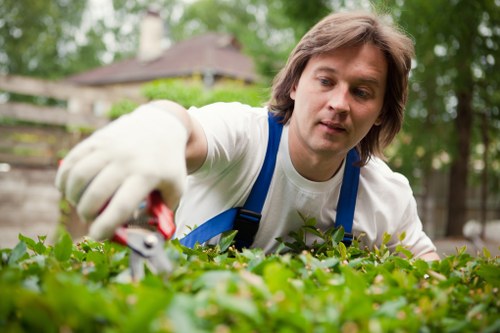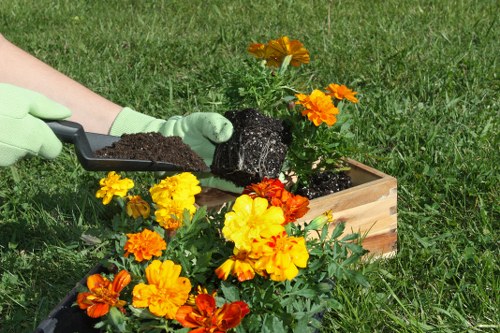Driveway Algae Removal Finchley: Keeping Your Driveway Clean and Safe

Algae growth on driveways is a common issue in Finchley, especially during damp and shaded periods. Not only does algae make your driveway look unsightly, but it can also create slippery surfaces, posing safety risks for you and your family.
Understanding the causes of algae growth is the first step in effective removal. Algae thrive in moist environments with minimal sunlight, making driveways in Finchley particularly susceptible due to the area's weather patterns.
Fortunately, there are several methods to remove algae from driveways, ranging from DIY solutions to professional services. In this article, we'll explore the best techniques to keep your driveway algae-free.

Why is Algae Growth a Problem on Driveways?
Algae growth is more than just a cosmetic issue. It can lead to:
- Slippery Surfaces: Algae makes surfaces slick, increasing the risk of slips and falls.
- Structural Damage: Persistent moisture can deteriorate driveway materials over time.
- Decreased Property Value: A dirty driveway can negatively impact the overall appearance and value of your home.
Addressing algae promptly ensures the longevity of your driveway and maintains the safety and aesthetics of your property.
There are various factors that contribute to algae growth, including humidity, shade, and the presence of organic matter.

Effective Methods for Algae Removal
1. Pressure Washing
Pressure washing is one of the most effective ways to remove algae from driveways. It uses high-pressure water jets to eliminate algae and other debris.
Benefits of Pressure Washing
- Quick and efficient
- Non-toxic and environmentally friendly
- Improves driveway appearance instantly
Ensure you hire a professional with the right equipment to avoid damaging your driveway surface.
Pressure washing not only removes algae but also cleans away dirt and stains, revitalizing your driveway.
2. Chemical Treatments
Chemical solutions can effectively kill algae and prevent regrowth. Common options include bleach and specialized algae removers.
How to Use Chemical Treatments
Follow the manufacturer's instructions carefully to ensure safety and effectiveness. Always wear protective gear when handling chemicals.
Neutralize the area with water after treatment to remove any residue and prevent damage to surrounding vegetation.

3. Natural Remedies
For those looking for eco-friendly options, natural remedies like vinegar and baking soda can be effective against algae.
Using Vinegar and Baking Soda
- Mix equal parts vinegar and water
- Sprinkle baking soda on the affected areas
- Apply the vinegar solution and scrub the driveway
This method is safe for pets and plants, making it a popular choice for environmentally conscious homeowners.
4. Preventative Measures
Prevention is key to avoiding future algae growth. Consider the following tips:
- Ensure proper drainage around your driveway to reduce moisture buildup.
- Trim surrounding vegetation to increase sunlight exposure.
- Regularly clean your driveway to prevent organic matter accumulation.
Implementing these measures can significantly reduce the likelihood of algae returning.

Hiring Professional Services in Finchley
While DIY methods can be effective, sometimes the best solution is to hire professionals. They have the expertise and equipment to ensure thorough algae removal.
Benefits of Professional Algae Removal
- Comprehensive cleaning
- Time-saving
- Long-lasting results
Professionals can also advise on preventative strategies tailored to your specific driveway and property conditions.
Choosing the Right Service Provider
When selecting a driveway algae removal service in Finchley, consider the following:
- Experience and expertise
- Customer reviews and testimonials
- Affordability and value for money
Ensure the provider uses environmentally friendly products to protect your property and the surrounding area.
Local Areas Near Finchley for Driveway Algae Removal
Finchley is surrounded by several nearby areas that may also require driveway algae removal services. Here are some of the closest areas:
- West Finchley
- East Finchley
- Mill Hill
- Barnet
- Brent Cross
- Totteridge
- Golders Green
- East Barnet
- Southgate
- Edgware
- Whetstone
- High Barnet
- New Southgate
- Chipping Barnet
Each of these areas has unique characteristics, but all share the common need for effective driveway algae removal to maintain clean and safe driveways.
Conclusion
Driveway algae removal in Finchley is essential for both safety and aesthetics. Whether you choose DIY methods or professional services, addressing algae growth promptly will keep your driveway in top condition.
Frequently Asked Questions (FAQs)
1. How often should I clean my driveway to prevent algae growth?
Regular cleaning, at least twice a year, can help prevent algae from establishing itself. In humid climates, more frequent cleaning may be necessary.
2. Are there eco-friendly solutions for algae removal?
Yes, natural remedies like vinegar and baking soda are effective and safe for the environment. Additionally, many professional services offer eco-friendly options.
3. Can algae damage my driveway permanently?
While algae itself doesn't cause structural damage, the moisture it retains can lead to deterioration of driveway materials over time if not addressed.
4. Is it necessary to hire a professional for algae removal?
While DIY methods can be effective for small areas, hiring a professional ensures thorough cleaning and long-lasting results, especially for larger driveways.
5. What preventative measures can I take to stop algae from returning?
Ensure proper drainage, increase sunlight exposure by trimming vegetation, and maintain regular cleaning routines to minimize moisture and organic matter buildup.


